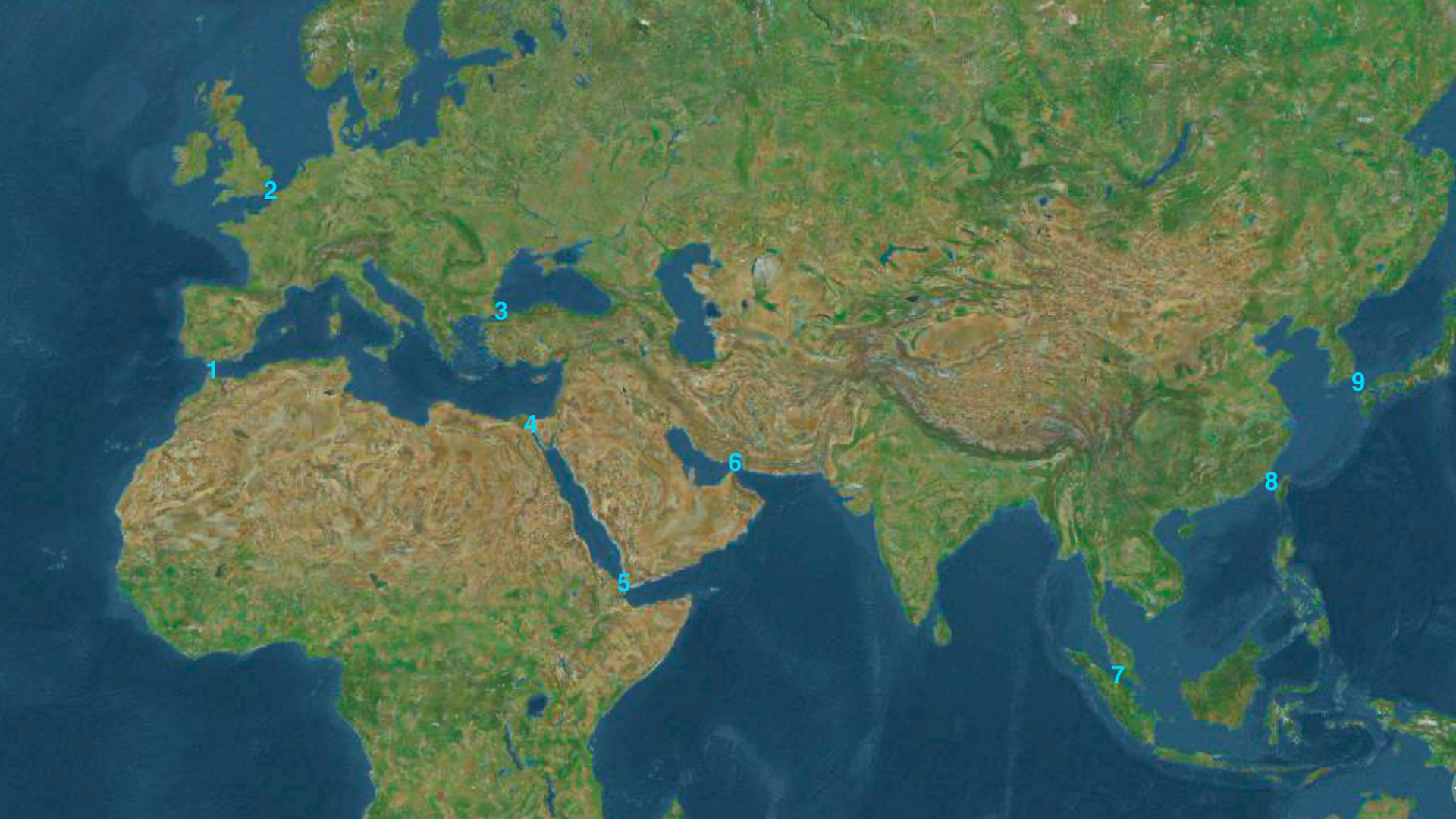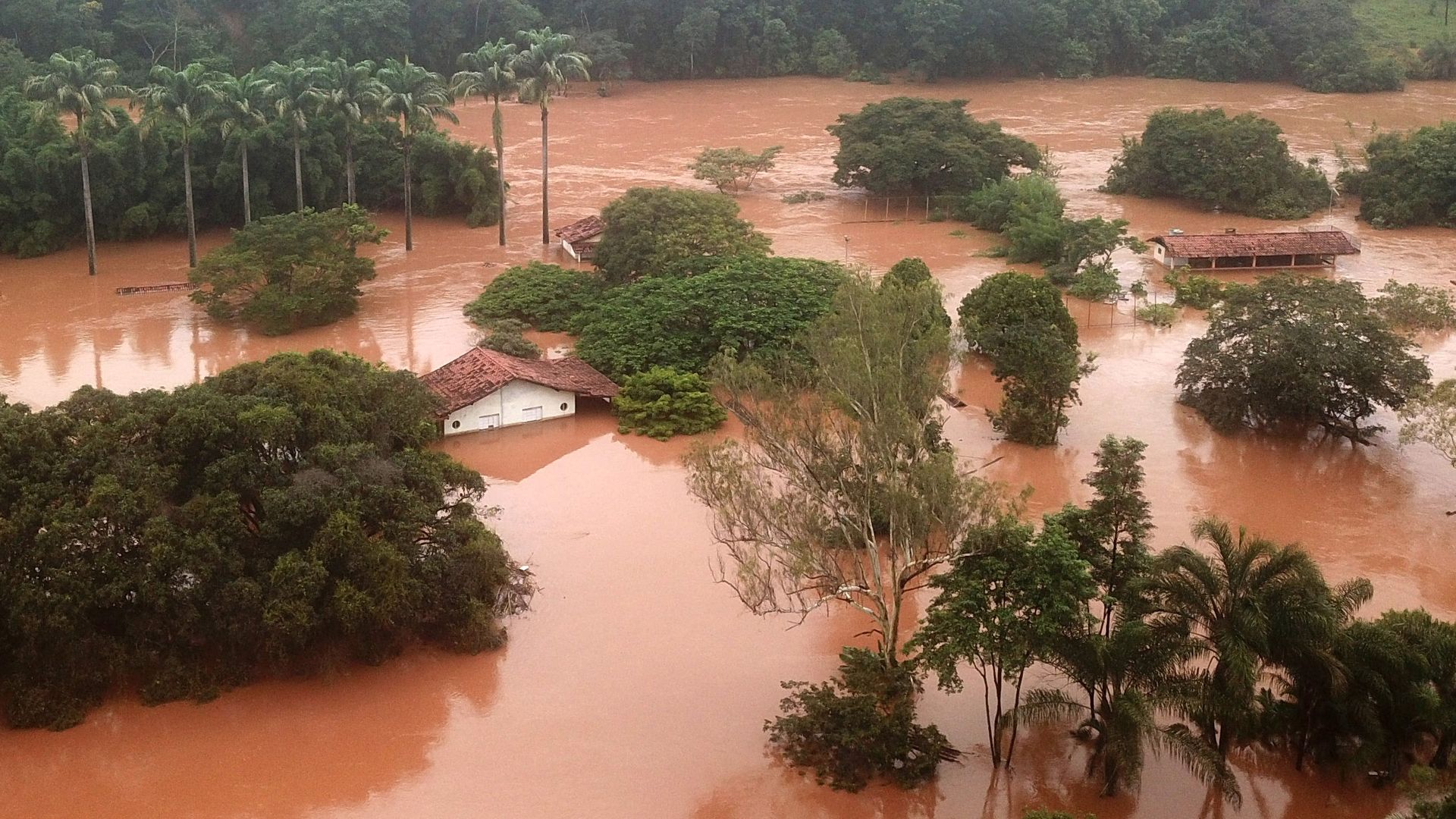| | | | | | | | | | | Axios World | | By Dave Lawler ·Jan 13, 2022 | | Welcome back to Axios World. - We start tonight's edition (1,834 words, 7 minutes) in Cameroon, stop by Downing Street for a drink, and accompany some Gulf officials on a trip to China.
| | | | | | 1 big thing: Soccer in a civil war |  | | | Security forces at an African Nations Championship game last year in the Anglophone city of Limbe. Photo: AFP via Getty | | | | Two deadly attacks this week in Anglophone regions of Cameroon underscore the security challenges the country faces as it hosts one of the world's biggest soccer tournaments, the Africa Cup of Nations. The big picture: What started in late 2016 as a protest movement led by teachers and lawyers in two English-speaking regions of western Cameroon has evolved into a civil war that has forced around 1 million people to flee their homes, left 700,000 children out of school, and carried on for five years with no sign of resolution. Driving the news: Separatist rebels killed one soldier during an attack Wednesday in the city of Buea, where four national teams taking part in the tournament are staying. - A rebel leader told Reuters the aim was to disrupt preparations for the games played on Wednesday in the nearby city of Limbe, which is slated to host five more games this month.
- In a separate incident on Tuesday, a prominent senator was shot dead in northwest Cameroon. No group claimed responsibility, but separatist militias have assassinated several politicians they deemed insufficiently supportive.
The history: The former German colony of Kamerun was divided into French and British protectorates after World War I, and reunified as independent Cameroon in 1961. - Both French and English are official languages, but French is spoken by around 80% of the population.
- Lawyers and teachers launched peaceful protests in late 2016 against what they saw as the marginalization of the Anglophone culture, and more specifically against the appointments of French-speaking judges and teachers in the Anglophone regions, says Ilaria Allegrozzi, senior Central Africa researcher for Human Rights Watch.
- The government responded with force. "They dispersed the protests, they shot at peaceful protesters, they arrested hundreds of them," Allegrozzi says. "This led to frustration, to resentment, and also to the creation of armed groups."
Separatist rebels declared the English-speaking regions an independent state called Ambazonia in 2017 and set out to make it impossible for the central government to control. - One particularly controversial tactic is a forced school boycott that has seen scores of pupils threatened, attacked or kidnapped for attending school. Many who still go to school attend secretly, making sure not to wear their uniforms in public. The UN says 2 in 3 schools in northwest and southwest Cameroon remain closed.
- The army, meanwhile, has allegedly burned villages and conducted arbitrary arrests during its counterinsurgency campaign, and it's "preparing for a long war," according to an International Crisis Group report.
- "With neither side clearly ascendant and both reluctant to engage in talks, the conflict has reached a stalemate amid a lack of international attention," the report notes. Both sides have been accused of abuses against civilians.
With Africa's most-watched sporting event coming to Cameroon this month, the government has attempted to show that it has control over the entire country, including by picking Limbe as one of the six primary venues. - The separatists, meanwhile, want to undermine the government and draw international attention to their cause.
- When organizers planned for the tournament's mascot to visit the large Anglophone city of Bamenda last month, it required not only a lion costume but a bulletproof vest and military escort.
|     | | | | | | 2. Invasion fears rise as Russia talks hit "dead end" |  | | | Putin with Defense Minister Sergei Shoigu. Photo: Russian Defense Ministry\TASS via Getty Images | | | | A week of diplomacy has only heightened fears of war. The latest: National security adviser Jake Sullivan said today that the U.S. has intelligence that Russia is "laying the groundwork" to create a false pretext to invade Ukraine and will share details publicly in the next 24 hours. Sullivan said, "the threat of military invasion is high." What they're saying: - Zbigniew Rau, the Polish chairman of the Organization for Security and Cooperation in Europe (OSCE), said at today's meeting with the Russians in Vienna that the risk of war in Europe was "greater than ever before in the last 30 years."
- Sergei Ryabkov, the veteran diplomat who led this week's talks from the Russian side, said they'd reached a "dead end."
- Alexander Lukashevich, Russia's ambassador to the OSCE, said that without a "constructive response to our proposals," Russia will have to take action to "eliminate unacceptable threats to our national security."
- Michael Carpenter, the U.S. ambassador to the OSCE, told reporters: "The drumbeat of war is sounding loud and the rhetoric has gotten rather shrill."
What to watch: There's a debate underway on Capitol Hill as to whether Russia is more likely to be deterred by immediate sanctions, or the threat of sanctions, Axios' Zach Basu reports. - The Senate defeated a bill today from Sen. Ted Cruz (R-Texas) to sanction the Nord Stream 2 pipeline, but will now take up a Democrat-sponsored package that would trigger a cascade of crushing sanctions — including on Vladimir Putin himself — if the Biden administration determines Russia has crossed a line on Ukraine.
- Putin's spokesperson said today that sanctioning the Russian president would be tantamount to severing relations.
|     | | | | | | 3. Another party on Downing Street |  | | | Today's front pages. Photo: Rasid Necati Aslim/Anadolu Agency via Getty | | | | With speculation already swirling that members of Parliament from Johnson's own party might soon force him out, the Daily Telegraph (Johnson's former employer) added tonight to the drip, drip of doom over lockdown-defying parties in Downing Street. Driving the news: The night before Prince Philip's funeral last April — at which the queen sat alone due to social distancing rules — Downing Street staff gathered at two parties for departing colleagues. - The rules at the time said Brits were not allowed to socialize indoors except with members of their own households.
- But some of the people helping to write those rules were, according to the Telegraph, dancing and drinking until after midnight. Johnson didn't attend.
State of play: Johnson apologized on Wednesday for attending a different BYOB party during a strict lockdown in May 2020 (more precisely, he apologized for the impression it caused but said he believed it to be a "work event"). - Johnson asked members to reserve judgment until after senior civil servant Sue Gray completes her inquiry into alleged lockdown violations on Downing Street.
- At least five Conservative MPs have already called for Johnson to step down. If 54 members express a lack of confidence in Johnson in writing, that would trigger a leadership election.
- U.K. media coverage has been full of the accounts of people who missed funerals or couldn't visit loved ones in the hospital while Johnson's staff gathered for social events. 6% of the public think Johnson is being honest, per YouGov.
What to watch: If a leadership contest is triggered (no sure thing), the early favorites to become party leader and prime minister would be Chancellor Rishi Sunak and Foreign Secretary Liz Truss. |     | | | | | | A message from Axios | | Start a new morning habit. | | |  | | | | Every weekday morning, host Niala Boodhoo catches you up quick on the latest news and interesting stories you won't hear anywhere else. In 10 minutes, you'll hear the latest scoops, smart analysis, and insights into the trends shaping our world. Listen now for free. | | | | | | Bonus: Where in the world? |  | | | Screengrab via Apple Maps | | | | Today, we're visiting nine of the world's most important straits (OK, one is a canal and one is a channel). Can you name them? Go deeper: The Washington Post has a lovely piece on life as a pilot steering massive ships through one of the straits seen above. Scroll to the bottom for the answer. |     | | | | | | 4. State of the outbreak: Tests and taxes |  Note: Prices vary within countries. France's and Malaysia's prices reflect legal price caps. Data: Axios research; Chart: Axios Visuals Graphic: The average cost of a single at-home rapid COVID test is about $12 in the U.S. They're free in Canada and the U.K. 1. First-dose appointments in Quebec increased after the government announced plans to tax people who are unvaccinated for nonmedical reasons. 2. Teachers across France staged a mass walkout today to protest ever-changing COVID-19 rules in the education sector, which they say fail to protect teachers and students, Axios' Ivana Saric writes. 3. Omicron infections are associated with a 91% lower risk of death compared to the Delta variant, the CDC said Wednesday, citing a Kaiser Permanente study, Axios' Oriana Gonzalez writes. 4. Israel is one of several countries currently shattering records of new cases, but Prime Minister Naftali Bennett is determined to ride out the fifth wave without new restrictions, Axios' Barak Ravid reports. 5. Spanish Prime Minister Pedro Sánchez has made the case for moving toward an approach where COVID will be treated more like the flu, with less intense tracking and testing. - Yes, but: WHO director-general Tedros Adhanom Ghebreyesus warned that while Omicron tends to cause less severe disease, deaths remain high and this isn't the time to "allow this virus a free ride."
|     | | | | | | 5. China hosts string of Gulf officials in sign of growing clout |  | | | Wang Yi (right) greets Faisal bin Farhan on Jan. 10. Photo: Ji Chunpeng/Xinhua via Getty | | | | China hosted four foreign ministers from the Gulf this week in a sign of Beijing's push for deeper involvement in the Middle East, Axios' Barak Ravid reports. Why it matters: There's a perception among Gulf leaders that the U.S. is slowly but surely pulling out of the region. Some U.S. officials are concerned about the degree to which China seems to be moving in. - A $23 billion deal for the U.S. to sell F-35 fighter jets to the UAE has stalled in part over U.S. concerns that China could get access to sensitive U.S. military technology.
- Last December, CNN reported that U.S. intelligence agencies assessed that Saudi Arabia is actively manufacturing ballistic missiles with the help of China.
- And last November, the WSJ reported that the Biden administration was concerned that China was secretly building a military facility at a port in the UAE.
Driving the news: On Monday, Saudi Foreign Minister Faisal bin Farhan met his Chinese counterpart Wang Yi in the city of Wuxi in eastern China. - Wang said both countries oppose "unilateralism and bullying," while Prince Faisal said his country opposes "interfering in China's domestic affairs" and supports China's positions on Taiwan, Xinjiang and human rights, according to the Chinese readout.
What's next: Iranian Foreign Minister Hossein Amir-Abdollahian is expected to travel to China in the coming days. |     | | | | | | 6. One to watch: Global race for electric vehicle raw materials |  | | | Illustration: Aïda Amer/Axios | | | | A bunch of new developments highlight the intensifying efforts by governments and corporations to secure key minerals needed for electric cars and other clean energy tech, Axios' Ben Geman writes. Driving the news: Tesla and Talon Metals announced a deal on Monday to supply the electric automaker with at least 75,000 metric tons of nickel concentrates from Talon's planned mine in Minnesota. - Separately, mining giant BHP said that it's investing $100 million in a major project in Tanzania for mining nickel, a key material for vehicle batteries and energy storage projects.
- Meanwhile, Bloomberg reports: "France is aiming to raise 1 billion euros ($1.1 billion) to help secure enough supply of metals for industries like battery manufacturing as prices of raw materials skyrocket."
- Back in the U.S., California Gov. Gavin Newsom's just-proposed budget plan aims to help spur the development of lithium deposits in the Salton Sea area.
What to watch: A global transition to cleaner mobility and power sources is slated to bring soaring demand for materials like lithium, nickel, cobalt and rare earth minerals. |     | | | | | | 7. Stories we're watching |  | | | Floods in southeastern Brazil. Photo: Douglas Magno/AFP via Getty | | | - Ahead of Iran deal decision, White House to "focus the fire on Trump"
- Another North Korean missile; U.S. wants sanctions
- Fighting the "uniting force of dictators"
- Syrian former intel officer gets life in prison for war crimes
- Gap between rich and poor countries is widening
- Thousands without power in Buenos Aires heat wave
- Record ocean temperatures
Quoted: "Let's be clear: Calling this product French is close to an ethnic slur." — Former French ambassador to the U.S. Gérard Araud, reacting to a decision by the U.S. Food and Drug Administration to stop regulating the labeling of French dressing. |     | | | | | | A message from Axios | | Start a new morning habit. | | |  | | | | Every weekday morning, host Niala Boodhoo catches you up quick on the latest news and interesting stories you won't hear anywhere else. In 10 minutes, you'll hear the latest scoops, smart analysis, and insights into the trends shaping our world. Listen now for free. | | | | Answers: 1. Strait of Gibraltar; 2. Strait of Dover (or English Channel); 3. Bosporus; 4. Suez Canal; 5. Bab el-Mandeb Strait; 6. Strait of Hormuz; 7. Strait of Malacca; 8. Taiwan Strait; 9. Korea Strait. |  | Bring the strength of Smart Brevity® to your team — more effective communications, powered by Axios HQ. | | | | | | Axios thanks our partners for supporting our newsletters. If you're interested in advertising, learn more here.
Sponsorship has no influence on editorial content. Axios, 3100 Clarendon Blvd, Suite 1300, Arlington VA 22201 | | | You received this email because you signed up for newsletters from Axios.
Change your preferences or unsubscribe here. | | | Was this email forwarded to you?
Sign up now to get Axios in your inbox. | | | | Follow Axios on social media:    | | | | | |












No comments:
Post a Comment